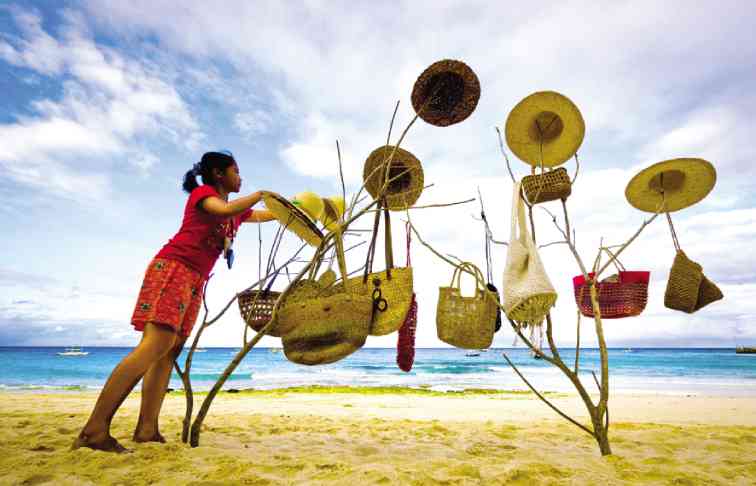
CCP celebrated its 87th anniversary in August and marked the occasion with the launch of its second book, Intimate Images. Leo Riingen’s “Retailer” and Billy Mandonedo’s “Baler Breakwater” are in the book.
Few organizations in the country can claim to have survived a World War and count among its members some of the nation’s most influential personalities.
Even fewer can make those same people—CEOs, former senior government officials, and even ex-Presidents—man registration tables and serve as ushers to other members who, in any other setting, would not even count as blips in their radars.
But that’s the Camera Club of the Philippines (CCP)—one of the most prestigious hobby groups in the country, so exclusive that you couldn’t buy yourself in even if you wanted to.
“It’s an invitation-only club. There’s no criteria as far as photography skills are concerned. You just have to be like us,” says Informatics CEO Leo Riingen, the club’s former president.
What exactly being “like us” means for CCP is unclear, if one looks at the group’s members on paper.
Among the popular ones are Jaime Zobel de Ayala, Jose EB Antonio and Fidel V. Ramos (an honorary member).
But over 150 others are part of the club, ranging from doctors and lawyers to amateur students and professional photographers. Most of them live their lives away from the public light.
Many Filipinos are passionate about photography, but to be part of CCP, the most important factor is being able to “gel with the group.”
“Yes, Jaime Zobel is a member, but no one calls him ‘sir’. Here, he’s just Jaime,” Riingen says in an interview.
CCP celebrated its 87th anniversary last month, marking the occasion with a homecoming party for inactive members, a photo exhibit, and the launch of the group’s second book, Intimate Images.
The book, featuring over 200 photographs, all taken in the Philippines by CCP members, is described as an “ode to cultural accommodation, translation, transition, and innovation.”
Put in simpler terms, the photos are beautiful.
On its own, the book is already a standout, according to Antonio Lilles, another former CCP president. “Someone’s been researching it, and it’s the only book by 158 members, made up of 263 images, by one camera club,” he says. Part of the proceeds from the sale of the book’s 2,000 copies, selling for P4,000 each on the club’s website, will go to the Philippine Cancer Society.
“Our club has evolved from purely pursuing the arts to raising social consciousness. Art is about touching the hearts of the beholder, but it becomes more relevant when it is used to help change the lives of those who are most in need,” CCP president Fred Yuson says in a statement.
Riingen says with the book launch and the recent homecoming, the current active membership hopes to reconnect with the club’s roots.
“There are some members who are no longer active so we invited them back,” he explains.
He says many members become inactive mainly because life gets busy for them. But CCP’s base remains solid, he says. About a quarter of CCP’s members are lifetime members, or those who have been part of the group for over 25 years.
The group’s oldest member is 92-year-old Amado Castro, who incidentally was Riingen’s former college professor.
To many of its members, the club’s monthly photography contests serve as the main venue for showing their creative chops.
The current king of the mountain at CCP, the so-called Master Photographer, is hobbyist Javier Flores, one of the club’s newest members.
Becoming Master Photographer means getting the most wins at CCP’s monthly photography contests, which are judged by professional photographers, advertising big-wigs and other artists. Winners receive a hefty trophy and bragging rights for a year.
Riingen says camaraderie, not competition, remains the club’s priority. All aspiring members go through a yearlong gauntlet of serving as “probees.” Their tasks include setting up exhibit booths during the club’s events, manning registration tables and making sure activities go smoothly.
“That’s why the club survives. You go through the same probationary period where you humble yourself,” Riingen says, “Everyone goes through that process, whether you’re a CEO or a student.”
In return, regular members get to join activities, learn new photography skills from peers, and—more importantly—make new friends.
“It’s a good way to keep myself sane. If you concentrate on work too much, you’ll get stressed out. Plus the fact that I meet people in the camera club that I don’t meet on my day-to-day dealings,” says Riingen.
While expanding one’s list of contacts can certainly help anyone’s career, Riingen says “networking,” as it is known in more corporate settings, is not the club’s goal.
“When you like something, you just want to be with others who have the same interest as you,” he says.
To anyone looking to pick up a new hobby and make lasting friends in the process, forget golf.
Get a camera, start shooting, and pray you get an invitation to literally join the club.
CCP celebrated its 87th anniversary in August and marked the occasion with the launch of its second book, Intimate Images. Leo Riingen’s “Retailer” and Billy Mandonedo’s “Baler Breakwater” are in the book.